In this series by Christopher James we investigate the 'Gay Best Friend' trope in movies.
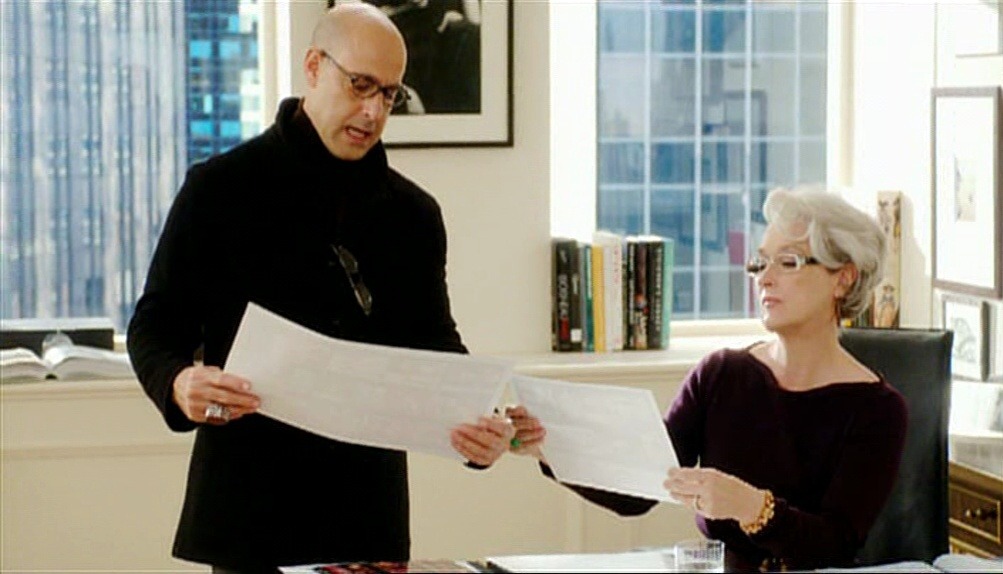
With the release of The Prom this Friday, people have been talking about the ethics of straight men taking on gay roles. As Nathaniel noted in his review, James Corden’s limp wrist and flouncy take on Barry is a tone deaf disaster. A large part of this comes from him, a straight man, constantly feeling like he must don exaggerated gay affectations rather than actually sketching out a three dimensional character. In 2020, we are in a place where we do have big name, openly gay actors more than qualified to tackle the gay roles that Hollywood writes.
While queer people should be prioritized when telling queer stories, there are many great gay performances by straight men. Perhaps one of the strongest examples is Stanley Tucci as Nigel in The Devil Wears Prada. While it’s clear from the jump that Nigel is gay, Tucci doesn’t “play” into the stereotype. Instead, his first point of reference for Nigel is a driven professional who is comfortably hyper-confident in his field...
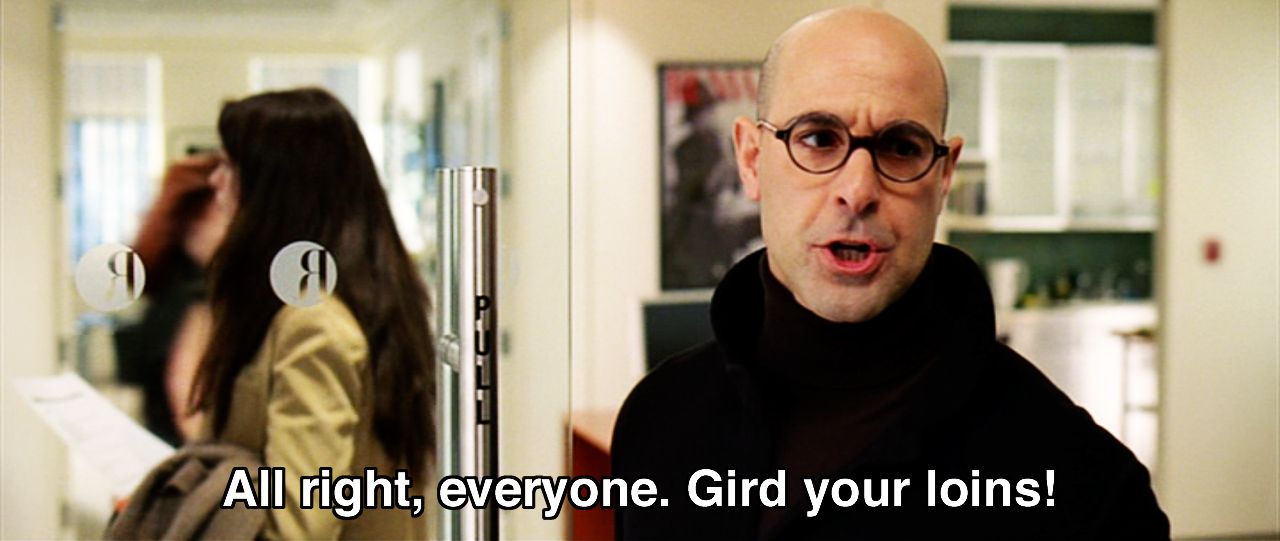 We're four minutes in when we meet Nigel in one of the most efficient and fun first acts in any film.
We're four minutes in when we meet Nigel in one of the most efficient and fun first acts in any film.
Simply put, The Devil Wears Prada is a movie where everyone is firing on all cylinders. From the first chords of KT Tunstall’s “Suddenly I See” during the fantastic opening montage, the film is off and there’s no stopping it. One of the most brilliant marketing decisions in film history (hyperbolic, yes, but also true) was using the inciting incident as the film’s trailer. In just minutes, we get a star entrance from Meryl Streep’s frightening Miranda Priestly, understand the movie’s stakes, and are introduced to the other three characters of the film’s masterful quartet. Miranda Priestly will likely be remembered as one of Meryl Streep’s top three career best performances. Emily Blunt steals every scene as Miranda’s haughty first assistant, Emily. Playing the straight man/audience surrogate, Anne Hathaway’s work as our protagonist Andie Sacks is often underrated. However, if Streep is the star of the film, Tucci is the beating heart.
Right before the infamous cerulean monologue, we get a sampling of his collaboration with Miranda. Up until now, Miranda has been this unparalleled tastemaker up on a pedestal. Her and Nigel talking through the design for a “full ballerina skirt and a hint of saloon” is a great meeting of the minds moments. Miranda solicits and listens to Nigel’s point of view. It’s important to Nigel’s character that we establish that he commands respect from everyone in the office, Miranda especially. During a later staff meeting, Miranda remarks “finally someone showed up for work today” after Nigel is the only person to give her productive notes during a staff meeting. The Devil Wears Prada supposes that the more time one spends at work, the less time one spends in their personal life. Nigel has given his entire life to Runway. His work life IS his personal life. Seeing him excel inside the walls of Runway is getting a window into his life. There is no “outside of Runway.”
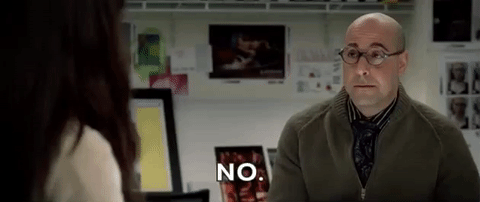
Nigel: Andy, be serious. You are not trying. You are whining. What is it that you want me to say to you, huh? Do you want me to say, "Poor you. Miranda's picking on you. Poor you. Poor Andy"? Hmm? Wake up, six. She's just doing her job. Don't you know that you are working at the place that published some of the greatest artists of the century? Halston, Lagerfeld, de la Renta. And what they did, what they created was greater than art because you live your life in it. Well, not you, obviously, but some people. You think this is just a magazine, hmm? This is not just a magazine. This is a shining beacon of hope for... oh, I don't know... let's say a young boy growing up in Rhode Island with six brothers, pretending to go to soccer practice when he was really going to sewing class and reading Runway under the covers at night with a flashlight. You have no idea how many legends have walked these halls. And what's worse, you don't care. Because this place, where so many people would die to work, you only deign to work. And you want to know why she doesn't kiss you on the forehead and give you a gold star on your homework at the end of the day. Wake up, sweetheart.
While Emily is openly hostile to the less fashionable, deer-in-headlights Andy, Nigel develops a fondness for her. He takes her under his wing, one barbed insult at a time. He’s Miranda’s closest confidant, so he knows his work life will be easier if he breaks Andy into the role. However, he’s not going to be her “gay best friend” that will just listen to her problems and sympathize.
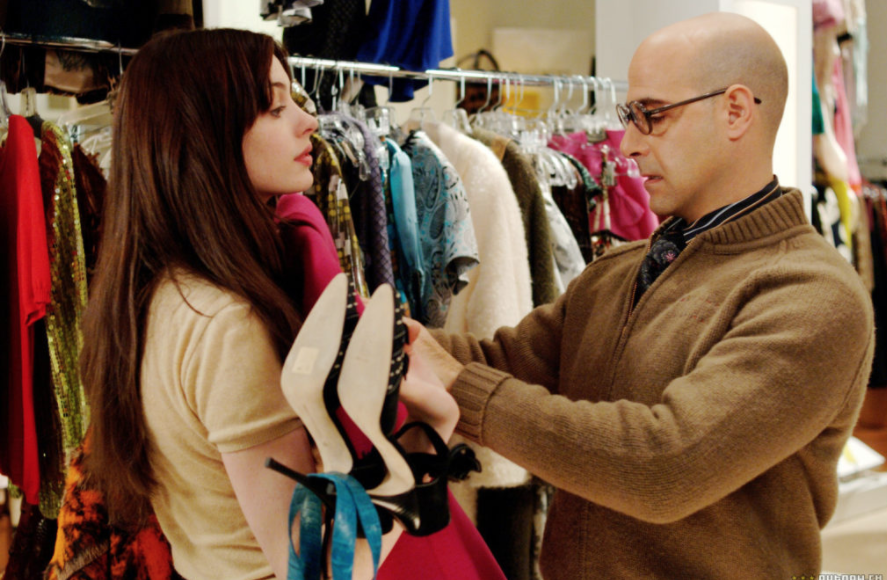
His reality check to Andy is only second to Miranda’s cerulean monologue. It also echoes something I’ve felt when outsiders love to suggest movies or entertainment “don’t matter.” To Nigel, fashion was his outlet when he was young, closeted and afraid. Runway was this dream that he was willing to give his life to. Watching someone hold a job in fashion but “not care” about it is maddening and insulting to those with a genuine passion for it. To work in a high stakes environment, it's not enough to be talented at the tasks the job requires of you. One has to marry skills with passion. Nigel is someone who structured his life around this dream, honing his talent and craft in the process.
Any “gay best friend” is forced to give the film’s leading lady a makeover. Nigel drolly delights in taking Andy from bargain sweaters to couture. However, it’s important to see that Nigel isn’t just treating Andy like a mannequin that he can toss clothes onto. The first makeover he gives her is a makeover in perspective on her job. If he’s going to help her, he needs to know that she desires to excel in her job as Miranda’s assistant, or else she’ll just be chewed up and spit out by the “Dragon Lady.” Andy asks for a makeover specifically because she decides she wants to be good at her job. That’s why Nigel helps her, not just because he’s a “gay best friend” looking for a project.
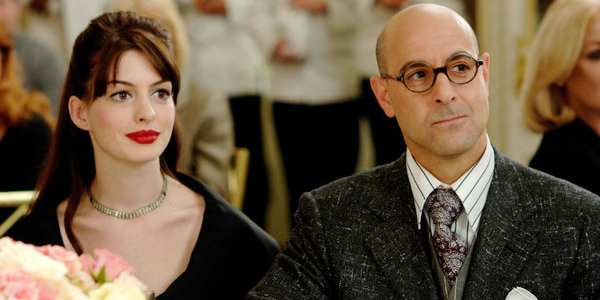 Looking sharp but the rugs about to be pulled out from under him
Looking sharp but the rugs about to be pulled out from under him
One of the frequent critiques of the “gay best friend” trope is that these characters often feel like cardboard cutout sounding boards or mere props in the leading lady’s life. The Devil Wears Prada doesn’t just give Nigel more depth than we may be accustomed to seeing, it also illustrates the damage of taking advantage of your “gay best friend’s” unwavering support.
Nigel: Can you believe it? For the first time in eighteen years, I’m going to call the shots in my own life. One day I might be able to come to Paris and actually... see Paris.
In Paris, Nigel pops champagne with Andy and toasts to his new job, being James Holt’s partner at his company, which is going public. He’s not just toasting to more money or power. Nigel will finally get control and balance. No longer bound to Runway, he will be his own boss and get to have a personal life he’s never afforded himself. You can feel Nigel exhale as he bursts of excitement from the balcony of his Parisian suite. He’s climbed the mountain and accomplished his childhood dream. It’s time for him to find a personal life as rich as his professional life.
Unfortunately, his new dream job is just that, a dream. For his closest confidant, Miranda, is about to stab him in the back.
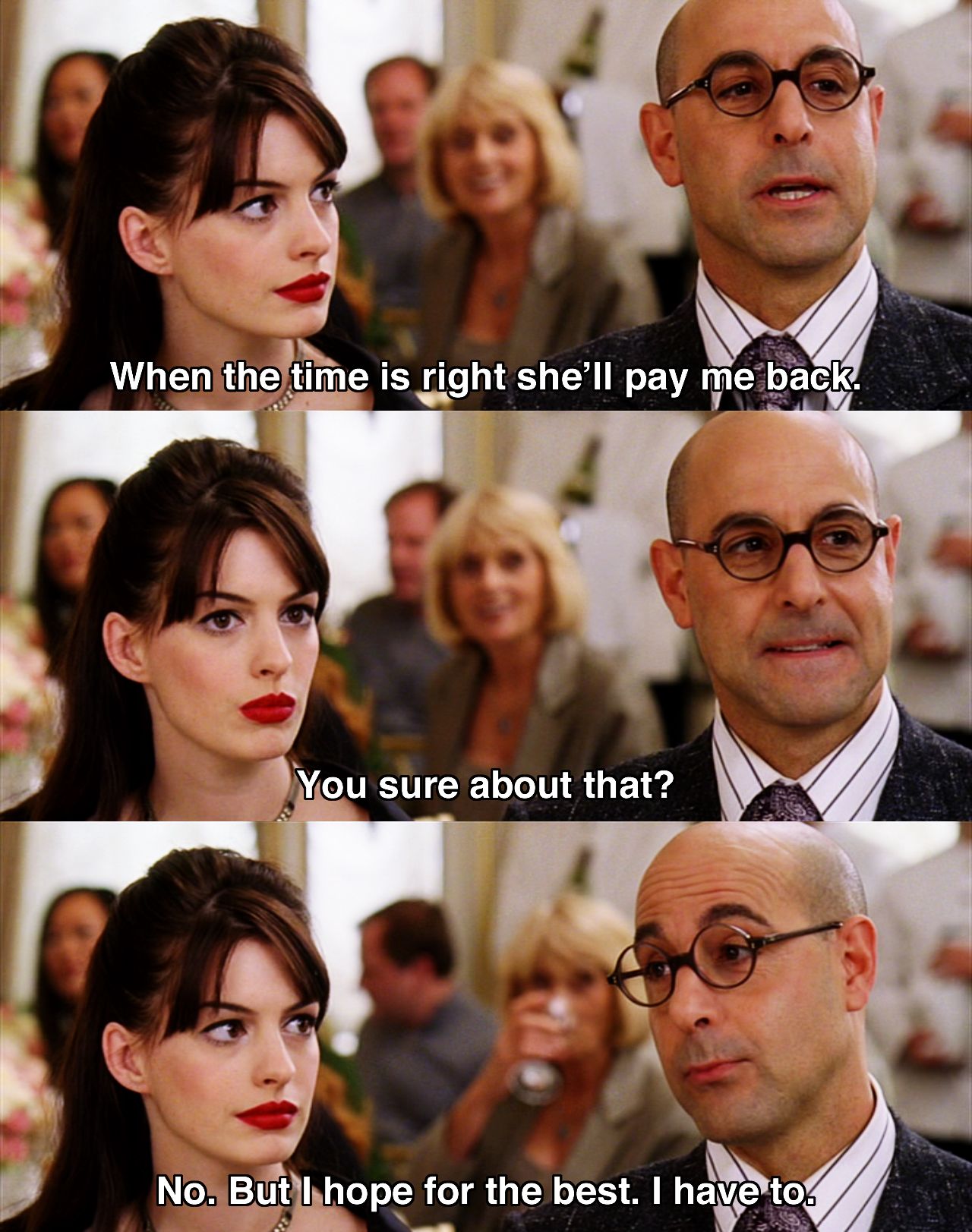
In giving Nigel’s promotion to “my esteemed colleague Jacqueline Follet,” Miranda is casting her friendship and loyalties aside for her own gain. She knows Nigel deserves the job, but also knows he’ll be in her pocket no matter how she betrays him. Her conception of her “gay best friend” is almost like a pet, he’ll come running back to you no matter what you do to him. The movie lingers on Stanley Tucci composing himself as he is forced to clap for the woman stealing his dream job. He will stand by Miranda, even as she snatches his dreams away from him. What else is he to do but hope for the best? Gay men need their allies, especially as they try and get ahead in corporate environments. Nigel’s connection to Miranda helped make his career, but it also keeps him from standing on his own two feet and being his own boss. Gay best friends aren’t allowed to exist independently from their female best friends.
Nigel’s story may end in (relative) tragedy. Yet, I’d like to believe he will one day achieve the work-life balance he desires. Tucci and screenwriter Aline Brosh McKenna do a fantastic job defining Nigel by his ambition and confidence. While we may not get to see Nigel sexualized (would love to see him go to some hot gay nightclubs in Paris), we get to see him excel and show expertise. He’s gay excellence personified and I want nothing but the best for him.
P.S.: I would absolutely devour a limited series spin-off about the epic decades long feud between Miranda Priestly and Jacqueline Follet, just in case anyone in development is listening.
P.P.S.: Technically Rich Sommer’s Doug is also coded as gay. However, we as a culture have talked too much about Andy’s friends being the real villains of the film. It definitely does not need to be dissected any further.
Previously in Gay Best Friend
-
Wallace Wells (Kieran Culkin) in Scott Pilgrim vs the World (2010)
-
Gareth (Simon Callow) and Matthew (John Hannah) in Four Weddings and a Funeral (1994)
-
George Downs (Rupert Everett) in My Best Friend’s Wedding (1997)
Who is your favorite (or least favorite) example of a “gay best friend” in movies? Let us know in the comments below.